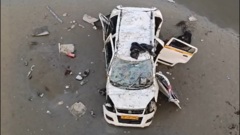**The fatal crash that claimed three lives in Uttar Pradesh has ignited discussions in India about the duty of navigation apps to provide accurate information and the consequences of relying on technology for travel guidance.**
**Tragic Accident in India Raises Questions About Navigation App Accountability**

**Tragic Accident in India Raises Questions About Navigation App Accountability**
**Incident involving Google Maps prompts debate over responsibility in roadway hazards**
A tragic car crash in Uttar Pradesh, India, has led to serious concerns regarding the reliability and accountability of navigation applications like Google Maps. The accident, which resulted in the deaths of three men on their way to a wedding, occurred when their vehicle veered off an unfinished bridge that had partially collapsed due to flooding earlier in the year.
Authorities believe that Google Maps directed the men onto this perilous route, which lacked necessary safety indicators such as barricades or warning signs. Following the incident, a police complaint has been lodged against several engineers from the state’s road department, as well as an unnamed representative from Google Maps, citing charges of culpable homicide.
In response to the ongoing investigation, a Google spokesperson has stated that the company is collaborating with law enforcement officials. This incident has sparked widespread debate about India's underdeveloped road infrastructure and whether navigation apps hold any responsibility for user safety.
Despite being the leading navigation application in India, with around 60 million active users, Google Maps has frequently faced criticism over inconsistent direction accuracy. Past incidents include a man who drowned in Maharashtra after following the app’s guidance into a dam, and two medical professionals in Kerala who similarly perished after their vehicle plunged into a river.
Experts assert that while navigation applications utilize GPS signals from users to track road conditions, updates rely on information from government agencies and user reports, making it challenging to maintain real-time accuracy. Ashish Nair, the creator of the mapping platform Potter Maps, emphasizes that users must exercise caution and personal judgment when using such apps, as their terms of service explicitly state that the platforms cannot be held liable for errors.
Contrastingly, legal experts are split on the issue of liability, with some suggesting that the Information Technology (IT) Act positions Google Maps as an 'intermediary', offering it protection from litigation unless it is proven the app failed to address known hazards.
The accident has spotlighted broader systemic issues in India regarding infrastructure monitoring and timely communication to navigation platforms. Advocates for advancement call for a more organized system to track and report road changes, suggesting that until there is a proactive effort from the government, the challenges surrounding reliable navigation will remain prevalent.
Authorities believe that Google Maps directed the men onto this perilous route, which lacked necessary safety indicators such as barricades or warning signs. Following the incident, a police complaint has been lodged against several engineers from the state’s road department, as well as an unnamed representative from Google Maps, citing charges of culpable homicide.
In response to the ongoing investigation, a Google spokesperson has stated that the company is collaborating with law enforcement officials. This incident has sparked widespread debate about India's underdeveloped road infrastructure and whether navigation apps hold any responsibility for user safety.
Despite being the leading navigation application in India, with around 60 million active users, Google Maps has frequently faced criticism over inconsistent direction accuracy. Past incidents include a man who drowned in Maharashtra after following the app’s guidance into a dam, and two medical professionals in Kerala who similarly perished after their vehicle plunged into a river.
Experts assert that while navigation applications utilize GPS signals from users to track road conditions, updates rely on information from government agencies and user reports, making it challenging to maintain real-time accuracy. Ashish Nair, the creator of the mapping platform Potter Maps, emphasizes that users must exercise caution and personal judgment when using such apps, as their terms of service explicitly state that the platforms cannot be held liable for errors.
Contrastingly, legal experts are split on the issue of liability, with some suggesting that the Information Technology (IT) Act positions Google Maps as an 'intermediary', offering it protection from litigation unless it is proven the app failed to address known hazards.
The accident has spotlighted broader systemic issues in India regarding infrastructure monitoring and timely communication to navigation platforms. Advocates for advancement call for a more organized system to track and report road changes, suggesting that until there is a proactive effort from the government, the challenges surrounding reliable navigation will remain prevalent.





















